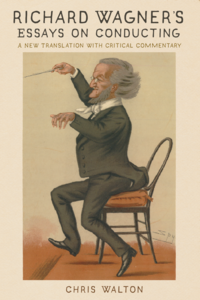Chris Walton
Richard Wagner’s Essays on Conducting
A New Translation with Critical Commentary
Eastman Studies in Music, Vol. 175
Rochester: University of Rochester Press, 2021
324 pages
ISBN 978-1-64825-012-5
e-ISBN 978-1-80010-189-0
Available in book stores or directly on the website of Boydell & Brewer
Also available Open Access.
Richard Wagner was one of the leading conductors of his time. Through his disciples Hans von Bülow, Hans Richter, Anton Seidl, Felix Mottl, Arthur Nikisch, and their many notable protégés, a Wagnerian art of interpretation became the norm in Europe and America until well into the twentieth century. Wagner’s essays on conducting had an even longer impact, and were upheld as central to their art by later generations of conductors from Mahler to Strauss, Furtwängler, Böhm, Scherchen, and beyond.
This is the first complete, modern translation of Wagner’s conducting essays to appear in English, and the first-ever edition to offer extensive annotations explaining their reception and impact. The accompanying critical essay offers a detailed analysis of Wagner’s conducting practices, his innovations in tempo and the art of transition, his creation of a new vocabulary to describe his art, and his success in establishing a school of conductors to promote his works and his aesthetic.
A publication related to the project Annotated Scores.
Contents
Introduction
PART I: RICHARD WAGNER’S WRITINGS ON CONDUCTING
Reminiscences of Spontini
Report on the Performance of Beethoven’s Ninth Symphony in Dresden in 1846
About Conducting
On Performing Beethoven’s Ninth Symphony
PART II: CRITICAL ESSAY
Richard Wagner and the Art of Conducting
